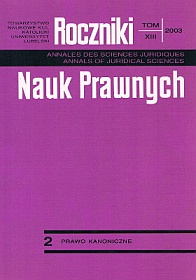The Institutions of Appeal in the Cases of the Invalidity of Marriage in the Canonical Trial
Abstract
The trial for the invalidity of marriage concerns the marital bond. This kind of procedures in church courts is most numerous. The judge in a trial is obliged to seek objective truth which is the foundation of a just verdict. One arrives at such truth following the process of meticulous and complex legal procedures in which the circumstance of a given case should be thoroughly examined in the first place. A correct solution of a case should lead the judge to objective conclusions in accordance with his conviction. In many case it happens so that the judge fails to evaluate these conclusions correctly. Consequently, he may give an unjust verdict. The church legislator has predicted this possibility in the case of a lower judge, therefore the party that feels wronged by the verdict, as he or she thinkers unjust, has a right to appeal. Thus the right to appeal (ius appellandi) is a statutory entitlement to appeal against the verdict of the lower instance to the higher instance. The examination of the content of the case is a means to appeal in the instance. This examination is designed to correct the mistakes made by the court of the first instance and improve the quality of legal decision as regards its conformity to the law.
Copyright (c) 2003 Roczniki Nauk Prawnych

This work is licensed under a Creative Commons Attribution-NonCommercial-NoDerivatives 4.0 International License.


